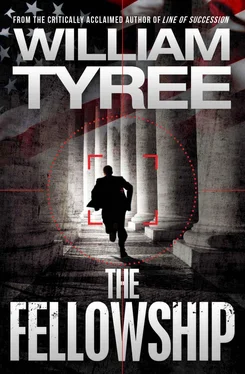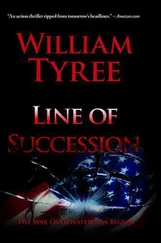William Tyree - The Fellowship
Здесь есть возможность читать онлайн «William Tyree - The Fellowship» весь текст электронной книги совершенно бесплатно (целиком полную версию без сокращений). В некоторых случаях можно слушать аудио, скачать через торрент в формате fb2 и присутствует краткое содержание. Год выпуска: 2013, Издательство: Massive, Жанр: Триллер, на английском языке. Описание произведения, (предисловие) а так же отзывы посетителей доступны на портале библиотеки ЛибКат.
- Название:The Fellowship
- Автор:
- Издательство:Massive
- Жанр:
- Год:2013
- ISBN:нет данных
- Рейтинг книги:5 / 5. Голосов: 1
-
Избранное:Добавить в избранное
- Отзывы:
-
Ваша оценка:
- 100
- 1
- 2
- 3
- 4
- 5
The Fellowship: краткое содержание, описание и аннотация
Предлагаем к чтению аннотацию, описание, краткое содержание или предисловие (зависит от того, что написал сам автор книги «The Fellowship»). Если вы не нашли необходимую информацию о книге — напишите в комментариях, мы постараемся отыскать её.
The Fellowship — читать онлайн бесплатно полную книгу (весь текст) целиком
Ниже представлен текст книги, разбитый по страницам. Система сохранения места последней прочитанной страницы, позволяет с удобством читать онлайн бесплатно книгу «The Fellowship», без необходимости каждый раз заново искать на чём Вы остановились. Поставьте закладку, и сможете в любой момент перейти на страницу, на которой закончили чтение.
Интервал:
Закладка:
The reality of what had just happened seemed to hit him all at once. He had been drafted into the SS.
*
Wolf descended the stairs of the yellow mansion for the final time, carrying a small brown suitcase containing the few personal effects he had managed to fit into it. A pair of athletic shoes made by a specialty shop in Munich. Assorted socks, briefs and a black peacoat. Two books of essays that he had composed in school. A green Duncan yo-yo that his father had brought back from a lecture series in America several years ago. Several family photographs. A framed photo of Lang, Albert and himself taken at a school festival the previous year.
He wished for a Bible, although he knew that even if he had one, he could not risk carrying it. Instead he brought a wilderness survival handbook and, with much regret, left all his other reading material behind. With the remaining space in his bag he had packed a deck of playing cards, a new leather-bound journal, pencil bag and, of course, his newest possession, the Reich School dagger.
He was shepherded through the pouring rain into the back of an Opel Blitz, a large green vehicle with a long wheelbase covered by wooden shingles on both sides of the truck bed. The top was covered with a brown canvas canopy and the back was left open.
Two more troop transports arrived. Over the course of the next 20 minutes the trucks were gradually filled with cadets. Wolf was joined by nine other boys, most of whom he knew only casually, as they were two years older. Regardless of age, all appeared to be in shock.
It was with great relief that, just as the truck motor started, Heinz Lang climbed into the back. The two boys grinned and shook hands, stopping just short of embracing. They grew silent as the vehicle began moving, watching out the open back as the yellow mansion they had called home gradually shrunk away.
“Where are we going?” one of the boys said.
Lang turned. “Isn’t it obvious?” He held up his conscription notice and pointed to a mark in the upper left-hand corner. It was the symbol of an Irminsul , the Life Tree in the ancient Saxon religion. “We’re not just in the SS. We’re in the Ahnenerbe. We’re headed to Berlin.”
At this observation, a gloom settled over the boys. For cadets that wanted nothing more than to bayonet a Russian in the chest, the prospect of joining the Ahnenerbe was a fate only slightly preferable to death.
“I wish they had sent me to a NAPOLA,” the boy said. The NAPOLA schools — or National Political Institutes of Education — were, despite the name implying otherwise, primarily military in nature. The Third Reich needed a steady supply of well-trained young officers who were properly indoctrinated in National Socialism.
Wolf was just as shell-shocked as anyone. But if he was going to be drafted, he wasn’t going to complain about the Ahnenerbe. The society’s members were recruited from all walks of life. They were anthropologists, pathologists, poets, scientists, runologists and even anthropologists, such as his father.
And this was the part that confounded Wolf most. The boys had obviously not gone to university. They possessed no particular field of study. They had not really even properly graduated from the Reich School. What use would they be? What were these special operations Nagel had alluded to?
Central Train Station
Munich
Unlike most of the other boys, Wolf had not been afflicted by homesickness during his time at the Reich School. Perhaps this was due to how drastically home had changed recently. His father was dead, his brother was off to war, and his mother was, for the first time in her life, working full-time to support the family. Despite its rigors, his time in Feldafing had seemed, at times, like a kind of extended vacation from life itself.
And yet as they stepped out of the trucks and were marched into the train station, Wolf was hit with a painful urge to see his mother. The Lebensborn clinic where she worked was scarcely five blocks south of the train station. He had not seen her since September, when parents were invited to watch the boys compete in a track and field competition.
Perhaps she was here, waiting for him? Surely the school had called to notify her of his graduation. The cadets were immediately marched inside the enormous glass and steel structure and toward their platform, where a short passenger train awaited them. None of the boys’ families were on hand. The only familiar faces belonged to Nagel and his staff.
Near the first platform, a brass and wind ensemble was playing Wagner’s Ride of the Valkyries for a group of Wehrmacht recruits boarding a train bound for the eastern front. Wolf did not envy the soldiers’ destination, but he envied their company. The soldiers were, one and all, draped with women — girlfriends, sisters, mothers and wives.
Wolf and Lang sat next to each other as the train snaked away from Munich and into the outlying farmland. The boys from the Reich School were packed into a single coach car. There were more cadets than seats, so three of them sat on their luggage near the rear.
Shortly, Nagel stepped in from an adjoining car that Wolf imagined was far more comfortable than their own. Observing Nagel from a distance, Wolf noticed how heavily decorated his uniform was. In addition to the Iron Cross that hung from his collar, he also wore a Wound Badge and a War Merit Cross and many other medals that must have been from the Great War.
He was an intimidating figure, but there was also something paternal about him. The boys quieted, focusing their attention on Nagel in hopes that he would reveal details of their journey. To their surprise, he grinned broadly and began singing a capella :
Good-bye, my sweet darling,
good-bye, good-bye, good-bye .
It has, it has to be parted,
good-bye, good-bye, good-bye .
It is about Germany's Glory,
Glory, Glory,
Hail Victory! Hail Victory! Victory!
It was a song that the boys knew well. The previous year it had spread like wildfire to every NAPOLA, Reich School and Hitler Youth organization in Germany. And so they all sang the second verse:
Sight and target are adjusted,
good-bye, good-bye, good-bye,
To Stalin, Churchill, Roosevelt,
good-bye, good-bye, good-bye,
It is about Germany's Glory,
Glory, Glory,
Hail Victory! Hail Victory! Victory! Even Wolf, who did not care for battle songs, felt a tingle of jubilance as they sang the third and fourth verses. At the song’s end, the boys fell silent, once again eager for information. Nagel’s gaze lingered on the cadets’ faces, making eye contact with each before speaking. “It is time that we were properly introduced,” he said. “I am Siegfried Nagel. I joined the military before many of your fathers were even born. I stood shoulder to shoulder with the fuhrer in the Odeonsplatz during the 1914 war rally.”Wolf had seen a now-famous photograph of the Odeonsplatz rally in government offices. On the eve of the 1932 presidential elections, the party had published the photograph of a man bearing Hitler’s likeness among a crowd of thousands in the Odeonsplatz, a public square outside the Residenz , the formal royal palace of the Bavarian monarchs. When he was a child, Wolf had heard his father’s university friends quietly arguing over whether the photograph had been faked. Nevertheless, it had been institutionalized as a symbol of Hitler’s longstanding patriotism.
“Five years later,” Nagel continued, “The Treaty of Versailles robbed us of our dignity. But I did not give up. Germany did not give up. Twelve years after leaving the army, Reichsfuhrer Himmler called me to serve in the SS, and I embraced the opportunity with an open heart. I have watched proudly as our nation has pulled itself up from dereliction to take its rightful place as a world empire. Today I am commandant of Wewelsburg Castle. That is our destination.”
Читать дальшеИнтервал:
Закладка:
Похожие книги на «The Fellowship»
Представляем Вашему вниманию похожие книги на «The Fellowship» списком для выбора. Мы отобрали схожую по названию и смыслу литературу в надежде предоставить читателям больше вариантов отыскать новые, интересные, ещё непрочитанные произведения.
Обсуждение, отзывы о книге «The Fellowship» и просто собственные мнения читателей. Оставьте ваши комментарии, напишите, что Вы думаете о произведении, его смысле или главных героях. Укажите что конкретно понравилось, а что нет, и почему Вы так считаете.











